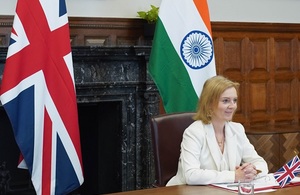Embrace free trade to drive the levelling-up agenda
The UK is well-placed and ready to seize the global opportunities of future trade, International Trade Secretary Liz Truss will say today (14 Sept).
In a speech to the Policy Exchange thinktank, Truss will set out the next phase of the UK’s trade strategy and explain why it is time to “move from defence to offence in trade” in order to drive a free trade revival in regions outside London and deliver the Government’s levelling up agenda.
She will set out how her Department will target trade deals with the fastest-growing parts of the global economy and ramp up support for exporters to help them seize new opportunities. She will say “the status quo is not an option”, and outline how her trade policy will open new trade routes beyond Europe.
The UK is already making significant headway in building more successful trade routes with the largest growing economies in the Indo-Pacific. The UK has already launched negotiations to join one of the world’s largest free trade areas, the Trans-Pacific Partnership, and will shortly kickstart negotiations with India, as well as Mexico and Canada.
The scale of the future opportunities is laid bare in a new report published by the Department for International Trade – the Global Trade Outlook – which identifies two major trends that underpin the UK’s strategic approach:
1) The centre of global economic gravity is moving away from Europe and towards the Indo-Pacific.
By 2030, 3 of the 4 largest economies in the world will be in the Indo-Pacific region. The region will account for 56% of global GDP growth and 44% of global import demand growth over the next thirty years.
2) Global demand for industries where Britain prospers is set to boom:
Demand for UK high-value industries such as digital and financial services will double in the next decade with demand for digital services expected to grow by 117%.
Ahead of the speech Liz Truss, International Trade Secretary, said:
In order to seize the opportunities of the future, we need to grow trade with the fastest-growing parts of the world while turbocharging digital and services commerce – which is exactly what we’re doing.
We are building a global network of next generation trade deals that are advanced in services and digital trade, and forging closer economic ties with markets in East Asia and the Asia-Pacific.
We know the demand for high-quality British goods and services exists, and is growing, therefore we need to ready British businesses for export and bolster inward investment across the country; creating new jobs, business and growth.
With just 1 in 10 British firms currently selling overseas, the International Trade Secretary wants to encourage more to export and make exporting the “norm for UK businesses”.
“The path to economic revival does not lie in retreating and retrenching,” she will argue, “but in free trade and free enterprise. British employers can only benefit from free trade by selling their products, innovation, capital, and ideas overseas”. Recent research shows trade disproportionately benefits consumers on the lowest incomes, as tradable goods and services are disproportionately consumed by those less well-off.
DIT is stepping up its export support across the country via its UK Trade and Investment offices and new Export Support Service. It is also attracting the world’s top investors, via the Office for Investment and the UK’s first Global Investment Summit.
Truss believes the UK’s forward-looking, liberalising trade strategy will lead to British businesses becoming high-wage, high-growth and high-productivity, which will drive the UK’s future economic success in the industries and economies of tomorrow.

